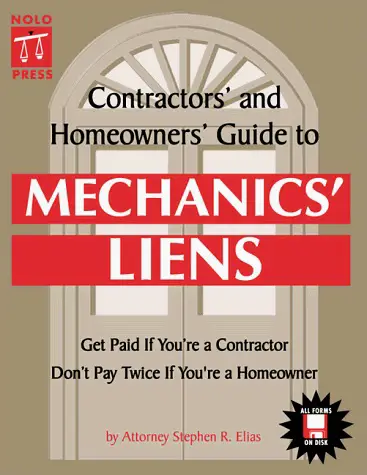Mechanic’s Liens
DEAR TIM: I recently paid my contractor in full for a large remodeling project. Several weeks after paying him, three sub-contractors and two material supply houses filed liens against my property. My attorney has advised me that these liens are in fact valid. Is just doesn't seem fair that I have to pay twice for the work. How could I have avoided this unpleasant situation? E.B.
DEAR E. B.: If it is any consolation, many people have been mired in the same situation as you have described. Fortunately, there are steps that you can take to prevent this from happening to you in the future. The first thing you need to do is to speak with a competent real estate attorney in your state concerning lien law in your state .
Many states have very specific laws regarding the rights of workmen and businesses that offer goods and services to homeowners. Often, these laws allow workmen and businesses the right to place a lien against a piece of real estate.
A lien simply is a matter of public record which states that there may be a valid, unpaid debt against the specific real estate named in the lien. In certain states, a lien can be a very powerful legal instrument.
For the most part, the laws were enacted to help protect honest workmen and material suppliers who, for one reason or another, don't receive payment from a homeowner. In your particular case, the individuals who filed the liens haven't been paid. You paid your contractor, but he, for some reason, decided not to give your money to the sub-contractors and the material suppliers.
This situation is very easy to avoid. However, it takes some work on your part. Because liens can have serious implications, the work is worthwhile.
Prior to the start of a project, ask your contractor to provide you a list of every person or sub-contractor who intends to work on your project. This list should contain the name and address of each person and what task they will be performing.
Also, ask for a list of material suppliers who will be delivering material to your house or job site. Make sure the lists are complete. In other words, if your job involves painting, there better be the name of a painter on the list.
Monitor the building process as closely as you can. Introduce yourself to each and every person at your job site. Ask them who they are and what they are doing. Make notes. Compare these notes with your list.
Depending upon the laws in your state, each and every person who works at your house and/or delivers material to your job site has the right to file a lien if they are not paid!
When it is time to make payments to your contractor, obtain a valid, signed, notarized affidavit or materialman's certificate from each and every individual or business who is owed money. These legal instruments are similar to receipts. You must obtain them.
Consider making out your payment checks individually to each person who is owed money. This is a tremendous amount of work, but may keep you out of court. Be sure you make arrangements to do this with your contractor at the beginning of the job.
The best advice is to consult with a competent real estate attorney prior to the start of your job. Ask him or her exactly what documents you should have prior to issuing payments to anyone. Issuing checks to contractors who do not present affidavits can be very risky business!
Column 032
